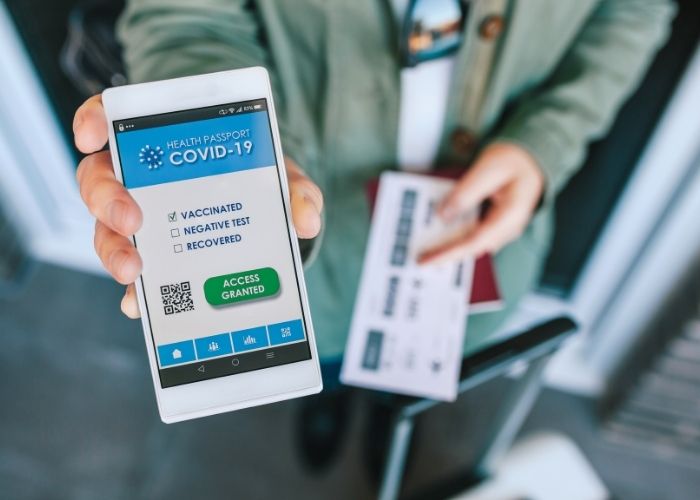More and more regional governments only want to keep the catering industry and other public leisure facilities open for people with a covid passport. As in all other European countries, the infection rates in Spain are also rising at a rapid pace.
In the regions of Catalonia, Aragón, Navarra, the Balearic Islands, Galicia, Valencia, and the Basque Country, the obligation to display a QR code in a number of public places has already come into effect (or will come into effect in the coming days). This QR code allows access only to people who are fully vaccinated, have recovered from covid-19 in the past six months, or have a recent negative test result.
The regions of Andalucia and the Canary Islands are still awaiting judicial approval for the implementation of the Covid passport. Only the regions of Extremadura, Castile-La Mancha and Madrid are not yet planning to keep leisure facilities closed to people who have not yet built up any immunity.
Most regions hope to reduce the number of infections before the holidays with this measure, without having to impose restrictions on economic activities. Below is an overview of the chosen coronapas policy per autonomous region.
Andalucia
The regional government of Andalucia already wanted to implement the covid passport last summer. That was rejected by the judge. However, now there is a request with the Supreme Court to make the Covid passport mandatory for all people who want to visit someone in hospital or in another inpatient care facility.
Aragon
In Aragon, the covid passport has been mandatory since November 25 for access to party halls and discotheques; celebrations such as weddings, baptisms, holy communions, all other social, family, religious celebrations, in bars and restaurants. Also for all events with more than 500 people inside and 1000 outside, a covid passport is mandatory.
Asturias
The district board of Asturias is still considering introducing the Covid passport. This has not yet been approved by the court.
The Balearic Islands
The Balearic Islands is awaiting the judge’s decision to implement the covid passport for access to discotheques and care homes and in all bars and restaurants where more than 50 people are allowed, including covered terraces.
Canary Islands
The Canary Islands district council has submitted a request to the Supreme Court after a previous rejection by the judge. This region wants to use the covid passport to access ‘all activities for which an adjusted maximum occupancy and opening time apply’. It is not further specified which occasions this refers to. Discotheques and bars can now decide for themselves whether they adjust their opening hours.
Cantabria
Regional president Miguel Ángel Revilla recently announced his intention to introduce vaccination controls. The regional council is still discussing a request to the court. It is not yet clear for which occasions the covid passport will be made mandatory.
Castile-La Mancha
Because the incidence (number of positively tested people per 100 thousand inhabitants) in this region is lower than the national average, the regional government sees no need to implement the Covid passport.
Castile and Leon
The regional government of Castile and León has announced it wants to introduce the Covid passport before the Puente de la Constitución (day off on Monday 6 December). It is now awaiting approval from regional experts, after which the Supreme Court will be asked for approval.
Catalonia
Weeks ago in Catalonia, a covid passport was requested when entering night bars and discos. Now the region also wants to introduce this measure for access to bars and restaurants, with the exception of the terrace. There is no need to show a covid passport in gyms, sports centres, indoor music festivals and care homes. Due to technical difficulties with downloading the QR code, the measure will not take effect until Friday December 3rd.
Valencia
The Supreme Court has approved the implementation of the Covid passport in Valencia. This must be displayed in all catering establishments, night bars, and discos with a capacity of more than 50 people. Hospitals and care homes are also only accessible with a QR code. The measure will take effect as soon as it is published in the region’s official state newspaper.
Extremadura
The Extremadura regional council first waits for the course of the booster injection campaign or before a decision is made on the implementation of the covid passport.
Galicia
In Galicia, the covid passport was already mandatory in nightlife, for overnight accommodations on the Camino de Santiago, and for a visit to a hospital. If the judicial approval is received, the covid passport will also become mandatory for all restaurants (all day) and bars (from 21:00). Galicia was the first Spanish region to introduce the use of the Covid passport. When the epidemiological situation improved, the regional government withdrew the measure. It is now in effect again.
La Rioja
The regional government of La Rioja is still discussing the implementation of the covid passport.
Madrid
The Madrid region does not consider it necessary to introduce the use of the QR code for some public places. However, the epidemiological development is being closely monitored, the regional administration said.
Murcia
Murcia has a unique policy within Spain: the region has implemented the covid passport, but leaves its use to the (night) venues themselves. That is, only in the municipalities with a low or average level of alertness. In catering establishments with a maximum capacity of 75%, the covid pass is not mandatory.
Navarra
From November 25, a covid passport will be mandatory in all restaurants with more than 60 guests, in discotheques and banquet halls, and at indoor cultural events where more than 1000 people gather.
Basque Country
The Supreme Court has approved the implantation of the Covid passport in nightlife and restaurants with more than 50 guests. The regional court had previously rejected this request, but that judgment has now been revised by the highest court.
Read how the vaccination rate has increased in Spain due to the introduction of Covid passports.


